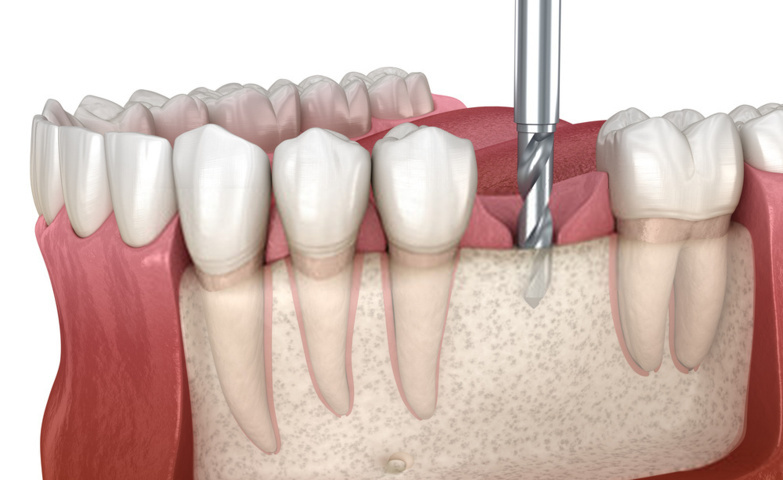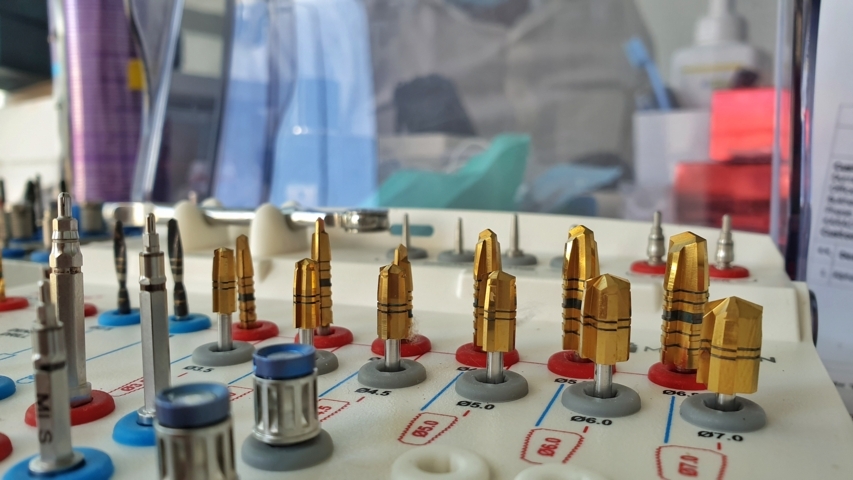
Settle for nothing, but the best!
Aesthetics and durability are, by far, the most considered qualities that a patient wants in dental treatment. Dental implants have become famous among patients who wish to replace their missing teeth.
What is a dental implant?
A dental implant is a fixed dental prosthesis that replaces one or more missing teeth individually, in a bridge or a denture, by a surgical procedure in which the screw is placed in the jawbones and once this heals and becomes a part of the jaw bone, an artificial tooth (abutment and crown) is fixed over the dental implant. They look precisely similar to the natural tooth, since the dental implant acts as the root of the tooth, while the crown serves as the visible functional part of the prosthesis. Dental implants can bond naturally with the jawbone; hence they are highly biocompatible. Dental implants are the best treatment option for missing teeth if oral hygiene is good, there are no or controlled medical problems and affordability is not an issue.
Who is the suitable candidate for dental implants?
Dental implants are a high maintenance dental treatment. Therefore, not everybody qualifies as a suitable candidate for them. Dental implants need the perfect oral environment before and after they are placed. If you fulfill the enlisted requirements then you may qualify as a candidate for dental implants;
- Your general health should be in good condition
- Good oral hygiene
- Adequate jawbone structure to support the implant
- Gums should be healthy
- If you were not a heavy or chain smoker
- It would be best if you are willing to take excellent care of your oral hygiene with regular visits to the dentist after you get the dental implant procedure done.
Dental implants provide strength and aesthetics, which have a powerful impact on your smile, making it more stunning and healthier; hence excellent aftercare of dental implants is essential.
How long does dental implant treatment take?
Although dental implants are a surgical procedure, placing a single dental implant can take 30 minutes while more extensive multiple dental implant placements can take a few hours also.
Once the initial implant procedure is done, it is left to become a part of the jawbone for 3 months (lower jaw) to 6 months (upper jaw). After the implant has successfully osseointegrated, an abutment is placed and impressions are taken for the fabrication of the implant crown, which is then permanently placed onto the implant. This case scenario is when the jawbone and gums are healthy and require no treatment. But if the jawbone needs to be altered (bone grafting) and any gum issues (periodontal problems) require dental treatment, the dental implant process will require more time since stabilization of gum health is extremely critical for any dental surgery.
For a professional assessment of your needs, call us on +92-21-3722744 at Durrani’s Dental Clinic to book an appointment.
How long do dental implants last?
Long-lasting and durable dental treatments are always preferred, but the success of any dental treatment depends solely on the cooperation, aftercare, and regular oral health maintenance by the patient. Dental implants have been proven to last an average of 10 to 14 years when a healthy oral environment is maintained and the patient does not suffer from any other general health issues.

What is the process of dental implants?
It is a process that can be easily divided into two phases. In the first phase, we place the implants and let them heal. In the second phase, we take impressions and place the final crown on the implants permanently. However, these two phases will be spread over 3 to 6 months, depending on the expanse of your specific treatment plan.
In the very first visit to the dental clinic, a thorough clinical examination is done to assess the mouth and see if the oral environment is in a favorable condition for dental implant placement. If there are no jawbone or gum issues or any other health-related problems, the dentists may counsel the patient and ask them to get the first phase of the dental implant process done under local anesthesia on the first visit to save time.
Once the implant fixtures are integrated (fused with the bone), which takes over a period of three to six months, the artificial tooth part is then placed on the healed implant. Getting dental implants can be a stretched-out process, but it is definitely worth the results. You will forget all the hassle once you can enjoy eating proper food or see a dazzling smile on your face after the completion of the dental implant process.
Dr. Shoaib Durrani at Durrani’s Dental Clinic counsels the patients in the best way to gain their trust and mentally prepare them for the process of dental implants.
How painful is a dental implant?
Many patients avoid visiting a dental clinic due to the fear of pain, but going to a dentist and talking your fears out is an integral part of Durrani’s Dental Clinic’s patient protocol. The different stages of dental implants can be surgical, where there might be some mild pain or discomfort for the first 24 hours. However, the administration of moderate or strong painkillers will make your healing very comfortable. Also, sedation, local anesthesia, and painkillers are super-efficient in eliminating the pain and discomfort. The dentist might even prescribe antibiotics before or after the implant placement procedure to prevent any infections for a comfortable recovery.
What is the downside of dental implants?
Dental treatments have a risk of failure and dental implants have their downside too, such as;
- The implants might not heal properly leading to infection
- The nerves may get damaged during the surgical procedure causing numbness or pain
- If not placed correctly, dental implants can damage other teeth
- Prolonged bleeding after the surgical process can occur which might cause a delay in healing
- Not everyone can afford dental implants as it relatively has a high treatment cost.
But the benefits of a dental implant overshadow their downside. Hence they are by far the best option for a fixed, semi-fixed, or removable replacement of single or multiple missing teeth. They have a high success rate in healthy and cautious patients.

